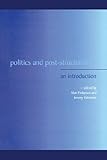Politics and Post-Structuralism : An Introduction / Alan Finlayson, Jeremy Valentine.
Material type: TextPublisher: Edinburgh : Edinburgh University Press, [2022]Copyright date: ©2002Description: 1 online resource (244 p.)Content type:
TextPublisher: Edinburgh : Edinburgh University Press, [2022]Copyright date: ©2002Description: 1 online resource (244 p.)Content type: - 9780748612963
- 9781474468213
- 320.011 21
- online - DeGruyter
| Item type | Current library | Call number | URL | Status | Notes | Barcode | |
|---|---|---|---|---|---|---|---|
 eBook
eBook
|
Biblioteca "Angelicum" Pont. Univ. S.Tommaso d'Aquino Nuvola online | online - DeGruyter (Browse shelf(Opens below)) | Online access | Not for loan (Accesso limitato) | Accesso per gli utenti autorizzati / Access for authorized users | (dgr)9781474468213 |
Frontmatter -- Contents -- Notes on the Contributors -- Introduction -- Part One. Politics and the Subject -- 1 The Subject and Subjectivity -- 2 The Theoretical Link Between Politics and the Subject -- 3 The State and Sovereign Subjectivity -- 4 After the Subject of International Security -- Part Two Doing Political Analysis -- 5 Ideology and Social Movements: the case of the FN -- 6 The Work of Ideas and Interests in Public Policy -- 7 Globalisation and the Constitution of Political Economy -- 8 Complexity in the Wild: action in local welfare -- 9 Political Science and Complexity -- Part Three Critique and Political Thought -- 10 The Horizon of Community -- 11 Critical Theory and Democracy -- 12 The Singularity of the Political -- 13 Genres, Technologies and Spaces of Being-In-Common -- Bibliography -- Index
restricted access online access with authorization star
http://purl.org/coar/access_right/c_16ec
Post-structuralism is recognised as a major force within literary and cultural studies. This book is the first to apply the theory to politics and to show the ways in which it can illuminate political theory and analysis. As such it is likely to become a key text in the development of this area, providing a stimulating introduction to the subject. Authors explore the two-way relationship, showing not only that post-structuralism can enhance the study of politics, but also that advocates of post-structuralism can benefit from being open to the lessons political studies can teach. The book aims to (i) clarify the relationship of contemporary theory to politics; (ii) open up a new intellectual interface; (iii) create a space for exchange between disciplines; (iv) provide a statement of the role of post-structuralist theory in politicsCovering three main sections - What is Post-structuralist Political Theory?; Post-structuralism and Political Analysis; and The Question of the Political - the authors draw on themes raised by Continental thinkers such as Derrida, Nancy and Deleuze, and Anglo-American thinkers such as Butler and Connolly in their questioning of the theoretical and empirical understanding of contemporary politics.Key Features First systematic examination of post-structuralism to see what it may mean for political studies Advances its own rigorous and theoretically informed position Cutting edge: provides a vibrant introduction to this area of political thought and analysis Brings clarity to the two-way relationship between post-structuralism and politics
Mode of access: Internet via World Wide Web.
In English.
Description based on online resource; title from PDF title page (publisher's Web site, viewed 29. Jun 2022)


